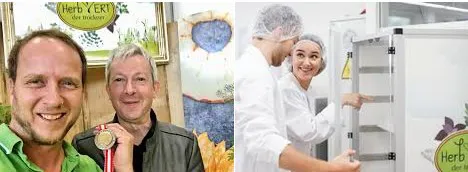In the midst of the ever-increasing crisis of the corona virus, non-perishable foods have gained enormously in importance. Two ambitious Austrians have developed the HerbERT drying oven as a suitable alternative to conventional tinned food. "The scope of this installation could become enormous."
The differences between various long-lasting foods can be manifold and in some cases extremely large. Canned foods are often pasteurised or sterilised to extend their shelf life. "However, pasteurization changes the taste of the food. In addition, they have to be stored in a cool place because sterility is not guaranteed. During sterilization, the temperature even rises to over 100 °C: the food is then sterile and has a very long shelf life, but loses some of its taste and important nutrients. Another disadvantage of this type of preservation is the high energy input," explain the two developers of the HerbERT process.
 Left: The two entrepreneurs: Eduard Paschinger and Bernhard Kastner (r). The system is offered in 2 sizes. There is a drying volume of around 0.7 m3 - for drying herbs, medicinal plants and small quantities of fruit and vegetables- but the system is also available with a drying volume of up to 30 m3 - for drying up to 300 kilograms of raw material.
Left: The two entrepreneurs: Eduard Paschinger and Bernhard Kastner (r). The system is offered in 2 sizes. There is a drying volume of around 0.7 m3 - for drying herbs, medicinal plants and small quantities of fruit and vegetables- but the system is also available with a drying volume of up to 30 m3 - for drying up to 300 kilograms of raw material.
Fuller taste through patented drying
This is where the revolutionary HerbERT drying oven system comes into play. Sliced food is simply distributed on the food-safe drying trays and then carefully dried for between 4 and 48 hours. The time required is influenced by various factors. The water content and the size of the goods to be dried both play an important role, according to Eduard Paschinger. He is the co-owner of the company, who -together with his cooperation partner Bernhard Kastner- is the driving force behind the innovative process. "HerbERT works gently, without heat. The name is a combination of the English terms for herbs (herb) and ERT (energy recovery technology). Through energy-extensive drying, all nutrients and colours are preserved, ending up with healthy, aromatic dried food stuffs."
Of course, the preservation of food is the most important factor, Paschinger emphasizes. "With HerbERT, we intend to prove that taste does not have to suffer. The patented cycle control dries herbs, fruit, vegetables, mushrooms and flowers reliably and carefully. In addition, HerbERT requires very little energy for drying due to our energy recovery technology". In addition, HerbeERT is the first drying system to have undergone strict testing by the Food Research Institute (LVA). The result: All products dried in HerbERT meet the strict hygiene and shelf life criteria.

Even before the crisis, the need was already there, Paschinger emphasized. "We have already had enquiries from several countries for the pre-drying of tea and spices to ensure contamination-free shipping overseas, but also for a sensible use of overcapacities of valuable agricultural products - such as unsaleable water melons damaged by hail.
High-quality fruit and vegetables during the crisis
The mobile and modular design allows for easy movement and quick assembly, which is why the process is used in various areas (such as direct marketing, specialist retail and weekly market trading and processing). The cabinet also offers protection against dust and dirt. "The well thought-out cycle control system allows, among other things, particularly sensitive herbs to be dried without destroying them. This means that the stomata of the plants remain relaxed, thus preventing drying stress."
Only water is extracted from the food, which increases its shelf life. "Our intention is to provide the consumer during the crisis not only with canned and canned items, but also with naturally preserved fruit and vegetables of high quality."
For more information:
entfeucher.at.gmbH - HerbERT
Eduard Paschinger & Bernhard Kastner
Dr. Franz Wilhelm Str. 2 
A-3500 Krems/Donau
+43 (0) 650 4711100
office@herb-ert.at
www.herb-ert.at
